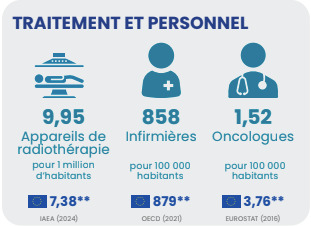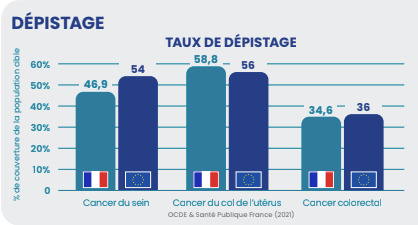Published on
Updated
Reading 2 min.
In its latest report devoted to France, the European Cancer Organization (ECO) reveals that our country is not necessarily a good student with regard to risk factors but also with regard to screening compared to its neighbors Europeans. Several improvements are urgent.
If France is active in the fight against cancer and has good institutes for the care of patients and competent professionals, it seems that this is not yet enough. According to a report from the European Cancer Organization (ECO) carried out on our country and published on May 13, 2024, cancer remains the leading cause of death in France and certain indicators are still alarming.
Too many smokers… and too few oncologists
What does this report tell us? That France is still the second country where people smoke the most in Europe. Excessive smoking which kills more than 48,000 French people each year, up to 60% more than in other European countries.
But this is not the only aggravating factor in this analysis. Several parameters must be taken into account:
- We are suffering from a shortage of personnel: France has 1.52 oncologists per 100,000 inhabitants, while the European average is 3.242, or twice as many;

- 30% of the French population lives in a medical desert, particularly affecting rural areas and elderly populations;
- Screening remains insufficient: the screening rate for colorectal cancer, for example, in France is only 34%, far from the 80% reached elsewhere in Europe;

- Inequalities in living standards remain: the 5-year survival rate of men with colorectal cancer from the most disadvantaged areas is 6.4 points lower than the rate of those from more advantaged areas; this difference is 5.5 points in women and reaches 15 points for certain cancers.
It is time to accelerate anti-cancer actions in Europe
By publishing these findings, the European Cancer Organization does not only wish to point out the bad figures, but to talk about future objectives. The ECO thus launched the European manifesto against cancerwhich includes clear objectives ahead of the European elections:
- Adopt a minimum age of 21 for the sale of tobacco (“tobacco 21”) to achieve a tobacco-free generation by 2040;
- Tax new tobacco and nicotine products in the same way as cigarettes and increase tax rates on cigarettes and fine-cut tobacco;
- Develop a European action plan for healthcare workers, including clear measures against shortages of oncology professionals across Europe, including reducing hospital bureaucracy and improving quality of life at work;
- Establish a standardized assessment of all major sources of inequalities in access to oncology care and concrete political actions to correct the differences observed.

